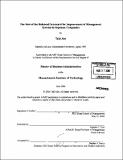The role of the Balanced Scorecard for improvement of management systems in Japanese companies
Author(s)
Abe, Taiji
DownloadFull printable version (5.361Mb)
Alternative title
Role of the BSC for improvement of management systems in Japanese companies
Other Contributors
Sloan School of Management.
Advisor
Arnoldo C. Hax.
Terms of use
Metadata
Show full item recordAbstract
The concept of the Balanced Scorecard (BSC) was first developed by R.S. Kaplan and D.P. Norton in 1992 and since that time has been implemented in thousands of organizations worldwide. While many tools that were proposed in the past tend to emphasize only one of values an organization has to realize, the Balanced Scorecard proposes that what is the most important for an organization be to balance these values for discrete stakeholders, ultimately for improvement of corporate value. This thesis considers the role of the Balanced Scorecard (BSC) in solving issues faced by management in Japanese companies. During the period when BSC was introduced to Japanese organizations, most recognized the need to change their strategies in order to overcome the recession and to challenge emerging new competitors, When an organization decides to change its strategies dramatically, it needs to renew or improve how it develops those strategies. Even if the company formulates an excellent strategy, it will not produce the desired results without implementation. In reality, then, most companies seek not only new ways of developing strategy but also new ways of implementing the strategy. (cont.) As the number of organizations considering BSC increased, most found not only a strong affinity for the concepts of BSC, but also considerable likelihood that BSC would bring improvements with relatively less conflict within the organization. As a result of my thesis research, including an examination of cases where BSC was introduced into Japanese companies, I found that while the reasons for introducing it varied, the BSC typically played these roles: (1) it made a strategy tangible, (2) it improved and created the capability within an organization, and (3) it enhanced the strategic mindset in employees, thereby resolving management issues. These roles highlighted the shortcomings in the management system of Japanese companies and enabled them to resolve these issues. Note: the views expressed in this thesis are those of the authors and do not necessarily reflect the views of Kirin Brewery Company, my employer.
Description
Thesis (M.B.A.)--Massachusetts Institute of Technology, Sloan School of Management, 2006. Includes bibliographical references (leaves 90-92).
Date issued
2006Department
Sloan School of ManagementPublisher
Massachusetts Institute of Technology
Keywords
Sloan School of Management.